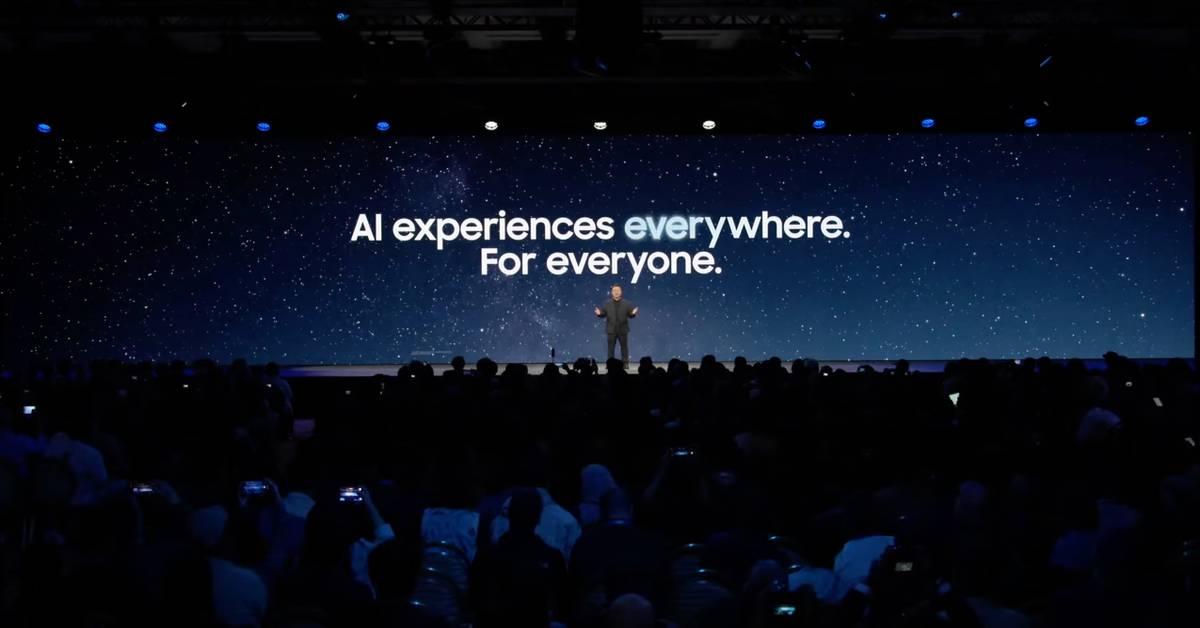Samsung's AI-Driven Design Revolution: Humanizing Technology for a Connected Future
2 Sources
2 Sources
[1]
[Editorial] Enriching Life Through Human-Centered Design
We are living through a defining moment in history. Technology has become a central force in our daily lives like never before, and the pace of innovation and change is truly extraordinary. In this rapidly evolving world, the human element -- our thoughts, emotions, aspirations and needs -- matters more than ever. Even as technology takes the lead, we believe our greatest strength lies in empathy and care. As designers, our mission goes beyond creating innovative products. We aim to elevate people's lives -- to design tools and experiences that help them live better, longer and more meaningfully, by taming technology in service of humanity. Samsung Electronics is a worldwide leader in tech and already plays an essential role in the lives of billions around the globe. Through our products, we help you clean your home, wash your clothes and dishes, preserve your food, store your memories, stay entertained, stay connected and express yourself -- whether at home, on the move or in public spaces. This reach is both a tremendous privilege and, in the age of AI and accelerated technological change, an incredible opportunity and an immense responsibility. That sense of purpose is what inspired me to join Samsung this year, after more than two decades as a designer and business leader across industries and cultures. I was drawn by the possibility to help reimagine the relationship between people and technology -- putting humans at the heart of our product universe, to create a world where innovation truly supports and enhances our lives, unlocking, amplifying and elevating the human side of technology. To me, design is far more than a product or a user interface. It's more than the interplay of form and function. I like to define design as the art of dreaming, crafting and taking to life distinctive solutions, meaningful experiences and authentic stories that deeply resonate with people's needs and aspirations. In this sense, form and function follow meaning. Design becomes a force for purposeful innovation -- one that begins and ends with people. Across Samsung's product portfolio, design serves as a language -- one that understands people and interprets the complexity of the world around us. It has the power to humanize technology, transforming algorithms into emotion, features into feelings. In a time of accelerating complexity, design is how we restore clarity and foster deeper connections -- with ourselves, our cultures and our lives. Samsung's commitment to design thinking dates back to 1996, when it declared the "Year of Design Revolution." That year marked a turning point, with design officially recognized as a core strategic asset. With a "human-centered design philosophy" at its heart, Samsung laid the foundation for a design ethos that continues to evolve and grow. Now, in the era of AI, our challenge is to build upon that legacy -- to amplify its intent, refine its spirit and redefine what design means in a new cultural and technological landscape. Products can be copied, but a design philosophy -- its purpose and point of view -- cannot be replicated. This is why culture matters. For individuals and for organizations alike, consistency, authentic creativity and genuine care at every touchpoint are what set great companies apart. Today, Samsung innovations are already transforming everyday life. Robot vacuum cleaners quietly maintain our homes. Smartwatches provide real-time insights into our health. Intelligent appliances, from washing machines to dishwashers, offer greater efficiency, performance and ease of use. Smart refrigerators adapt to our habits to keep food fresher for longer. Our screens deliver breathtaking visuals, our audio systems fill rooms with immersive soundscapes, and our smartphones, tablets and wearables keep us connected through intuitive design and purposeful features. All of this is remarkable. Yet, the real frontier lies in something greater: the seamless integration of all these devices into a coherent, human-centered journey. We're not just designing individual products -- we're designing an ecosystem of experiences. We're redefining what "smart" really means by infusing technology with empathy, meaning and emotional resonance. Samsung's design now goes beyond the object. It places thoughtful connections, insightful information, and intentional emotions at the center. Through a cohesive design experience across our entire ecosystem -- from mobile to TV to home appliances -- we're committed to enriching every interaction. Our vision is a future where design brings warmth to innovation, and where technology helps us not only do more -- but live longer, live better, and live more connected, and more meaningfully, creating an empathetic layer between people and their environments. This personal field of emotionally attuned, physiologically aware, and ethically governed technologies interconnects to form constellations of care -- enabling shared rhythms and deeper connection across the home, family and community. The next frontier of smart technology must offer more than just functionality. With Samsung's advancements in AI, empowered by hardware and software, we are unlocking a new dimension of emotional intelligence -- where technology doesn't just work for us, but resonates with us. What excites me most about AI in product design is how it enables us to listen, learn and craft experiences that feel deeply personal. As intelligence becomes ambient -- woven seamlessly into our everyday devices -- design takes on a greater responsibility: to ensure that intelligence feels warm, human and caring. We're shifting from devices that demand our attention to those that pay attention, anticipating needs, adapting preferences and forming meaningful relationships with users. We're envisioning an ecosystem where intelligence isn't confined to one device, but exists around you -- quiet, empathetic, always present when needed, and gracefully invisible when not. Samsung's holistic approach to AI spans across the entire ecosystem -- from smartphones to TVs, wearables to home appliances -- transforming each product into a thoughtful companion in your daily life. Imagine a TV that mirrors your mood. A refrigerator that understands your dietary goals. A watch or ring that knows when you need rest, and gently guides you toward better mental and physical wellbeing. This is not just innovation -- it's a design philosophy where intelligence surrounds you, senses you, learns from you and ultimately adapts to serve you better. Each product becomes part of a larger, unified story, grounded in empathy, awareness and care. Technology will always continue to evolve. But what truly matters is the meaning it brings -- to individuals and to society. At Samsung, we innovate not just because we can, but because we care. It starts with a sincere commitment to people and a deep sense of responsibility for the impact we create. What has always inspired me about Samsung is its belief in openness -- not just as a platform strategy, but as a cultural principle. Openness to collaboration. Openness to bold, unconventional ideas. Openness to meeting people where they are. This spirit of openness removes barriers, fuels connection and sets the stage for truly meaningful innovation. These are the values that have shaped my career and the principles I believe will drive our industry forward. They reflect a shared mission: to build technology that enriches human life, with empathy at its core. Through our love for humanity and our clear vision for the future, we invite you to join us on this journey -- one shaped by Samsung Design, and guided by purpose, care and imagination.
[2]
Samsung reveals its new AI-first design strategy, starting with glasses (exclusive)
Samsung is the world's leading consumer electronics company, and its technological innovations (like folding phones with deeply integrated AI) are unmatched. But it's hard to be the biggest or best at everything, and the company's market share has eroded for the first time in a decade across some of its biggest categories: smartphones, televisions, displays, DRAM (computer chips), and car displays. The company is not on fire -- its revenue grew 11% in 2024 to reach nearly $220 billion. But its identity remains monolithic, while it faces headwinds in almost every direction, literally, from Apple in America to a slew of electronics companies in China. Furthermore, it must contend with a simple truth facing everyone in this industry: The next five years of AI development could very well shape our next 50. It's why Mauro Porcini has such an overwhelming task in front of him. After leaving PepsiCo earlier this year, he's become Samsung's first chief design officer and its first foreign design lead. His hiring signals an intentional shift in Samsung's strategy to look beyond Korea's own rich design culture and modernize the global brand for the era ahead. For his first interview in the role, Porcini sat down for an exclusive conversation with Fast Company to outline his vision after his first three months in Seoul. Anyone who has followed Porcini's career will be unsurprised by his liberal references to fuzzy feelings. He insists that it's Samsung's role to address Maslow's hierarchy of needs in each of us, while positioning "design as an act of love and literally making sure that we put people at the center of everything."
Share
Share
Copy Link
Samsung's new Chief Design Officer, Mauro Porcini, outlines the company's vision for AI-integrated, human-centered design across its product ecosystem, aiming to create emotionally intelligent and empathetic technology.
Samsung's New Design Philosophy: Humanizing Technology
Samsung Electronics, a global leader in technology, is embarking on a transformative journey to redefine its design philosophy in the age of AI. Mauro Porcini, Samsung's first foreign Chief Design Officer, is spearheading this initiative to create a more human-centered approach to technology design
1
.
Source: Fast Company
The Human Element in Technological Innovation
In an era of rapid technological advancement, Samsung recognizes the critical importance of the human element. Porcini emphasizes that design should go beyond mere functionality, aiming to "elevate people's lives" by creating tools and experiences that enhance living in meaningful ways
1
.AI-Driven Design: Beyond Functionality
Samsung's vision for the future of design in the AI era is ambitious and far-reaching. The company aims to:
- Infuse technology with empathy and emotional resonance
- Create an ecosystem of experiences rather than isolated products
- Develop emotionally intelligent and physiologically aware technologies
1
Challenges and Opportunities
Despite Samsung's strong market position, with revenues reaching nearly $220 billion in 2024, the company faces challenges. It has experienced market share erosion in key product categories and must navigate the rapidly evolving AI landscape
2
.Related Stories
A New Era of Design Leadership

Source: Samsung
Porcini's appointment as Samsung's first foreign design lead signals a strategic shift. His vision involves:
- Addressing Maslow's hierarchy of needs through product design
- Positioning design as "an act of love"
- Ensuring a people-centric approach in all aspects of product development
2
The Future of Samsung's Design
Samsung's design strategy now extends beyond individual products to create a cohesive ecosystem. The company envisions:
- Seamless integration of devices into a human-centered journey
- Redefining "smart" technology by infusing it with empathy and emotional resonance
- Creating a personal field of emotionally attuned and ethically governed technologies
1
As Samsung navigates the next frontier of smart technology, its focus on emotional intelligence and human-centered design could potentially reshape the relationship between people and technology, creating a more empathetic and connected future.
References
Summarized by
Navi
Related Stories
Recent Highlights
1
Pentagon threatens to cut Anthropic's $200M contract over AI safety restrictions in military ops
Policy and Regulation

2
ByteDance's Seedance 2.0 AI video generator triggers copyright infringement battle with Hollywood
Policy and Regulation

3
OpenAI closes in on $100 billion funding round with $850 billion valuation as spending plans shift
Business and Economy








